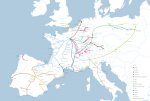I know that question is addressed to carjosse, but I had the same thought when reading the list and I partially agree with his answer. The USA is #8 on the list, and for 6 of the remaining 7, they are all tiny countries/city-states that benefit from the exclusive ability to offer spectacularly attractive incentives to wealthy citizens/corporations to relocate and operate within their border which larger population countries cannot afford to match. It inflates their GDP per capita and doesn't make for a good comparison.
Also if you don't get what I mean by that, when you have large populations as a country, you need significant revenues (taxes) in order to operate the necessary healthcare, education, welfare, bureaucracies, etc. systems. And comparatively the tiniest countries/city-states don't have this overhead. Therefore they can offer up these crazy tax breaks and corporate benefits that would drive other countries into bankruptcy, but for them is still is enough to be able to cover their operations while at the same time attracts "on-paper" the world's wealthiest and most productive individuals.
However I disagree with Norway not being in the same class as the United States. They've got a large population and also the citizen demands that would normally occur for a non-tiny state. It just so happens that their politicians by chance came up with and managed to execute a genius, world-class plan to use oil revenues to create a gigantic pension fund for everyone.
They do not have the institutions nor the human capital to harness their resources.


